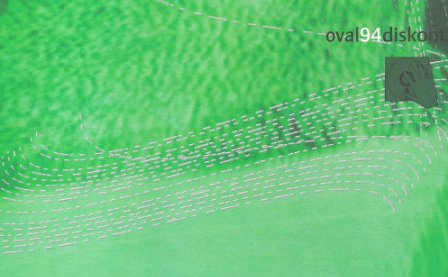There’s a German word to describe Oval’s sound here: naturidentisch. The literal translation would be “nature identical,” but it’s more widely translated as “naturally artificial flavoring” and is used to describe the flavor of industrially-processed drinks like Coca-Cola or any food constructed synthetically so that its flavor (usually made from different parts of corn) is convincingly real. Voa, as well as its sister album Calidostópia!, is a sonic naturidentisch because of how it dislocates melody from its source — South American singers — taking something organic (the vocals, the bodies of the singers, their origins, and their histories, including the struggles that their countries endured from war and globalization) and pairing it with something non-organic: the glitchy, chrome-colored, electronic atonality of Oval’s production. What I think Oval is getting at, besides simply collaborating with the singers, is a theory about managing melody in a digital age, about which melodies are used in an electronic world littered with jingles, singing competitions, online voice lessons, and YouTube singers being “discovered” (only to sign up for record deals, record an album, and quickly disappear). Voa is a thesis that can be described simply as one word, found in the tags section for the album on his Bandcamp: metamelody.
Meta: that strange prefix, that all-encompassing, potent prefix, able to fasten itself onto any word and give it a new, strange luster, a beyondness that deadens borders, lines, and diagrams; it’s the ultimate prefix to describe the invisible spirituality we all contain inside of us, the ultimate prefix that makes an object galactic, shimmering in mystery and prophecy. A method of going beyond a melody is to go beyond the boundaries (and the language) where that melody came from — a paradoxical gesture here, because the singers, singing in Portuguese, Spanish, and English, are singing folk melodies we usually hear accompanied with a guitar or a piano, rather than a bunch of blips, bleeps, splats, blips, booms, splices, and splashes. In other words, these are melodies anchored in South America and trapped within a tradition that goes back for years. Oval’s production — a bitter sound of in-between hertz levels and abstract, lean-muscled soundwaves (the sound of 73% cacao) — artificially flavors them like an organic, USDA-approved microwaveable TV dinner. He’s trying to prove that melody, the last bastion of our sound-to-body relationship, can be an abstraction of itself. You wouldn’t think that the hotness of South America and the coldness of Germany could ever match up; I think Oval understands this, and knows how sappy folktronica is (or was?) as a genre and how deadening to think that the binary between organic and non-organic is a binary at all. There’s plenty of glacial-ness on Voa, but hey, even glaciers can exude a sense of warmth sometimes. To some microorganisms, a glacier is called home. To Oval, a bossa-nova singer doesn’t need to always be accompanied with guitars, trumpets, or pianos: a laptop will do, even if it leads to a messy soundscape of side-information, peripheral vision, blurs, smudges, the paleness of a German highway, or the red laser of a surgical doctor.
Metamelody here is determined by how much it isn’t there: kind of like how really good tomato sauce is formed from just the right amount of the juice evaporating. The melodies flirt with the line between complete expression (utterly flawless execution, utter worship of the vocal cords, a soul pouring over) to a dissonance, as if the background landscapes we’ve created for these singers is disappearing, either from globalization, deforestation, new highways, cross-culturalization, or new economic prospects. Voa is not only a theory, but also a question: what is organic about the voice anymore? Folklore music can still exist, but it’s also being replaced or listened to in conjunction with so many other electronic musics that it’s starting to feel antiquated and rather unnecessary in understanding how a third-world country actually thinks, or how any country thinks, at that rate.
What’s frustrating about this album is that Oval doesn’t emphasize how two cultures can merge into one: he remains in his own boundaries and the singers remain in theirs, and in the end, all we have here, on the surface, is a dissonant pairing between two different cultures. In its own way, Voa reminds me of the imperialism of the British and the French, and more specifically, of their rashness in thinking that their culture could be exported to other people in other lands. There’s a very oil-and-vinegar sound to this album, which of course tastes bad and makes for bad food. I’m all for the technological electrification of folk music, but I’m not for hiding how sociological melody is when paired with glitches, even if it comes from the “glitch legend” that Markus Popp is.
Without technology and the rise of the personal computer, as well as the rise of the problems that came with computer usage in the 90s (viruses, problematic software jargon, bad loading, crummy graphics, glitches), we wouldn’t have all this language and all this music that relates to technology. Several cultures grew from all of this — hacker culture, office culture, post-human Deleuzian culture, 1980s cyber-cafe-end-of-the-world culture, cyberpunk culture — and a whole set of new languages developed, including that word: glitch, or in German, fehler. A computer glitch is a computerfehler, a brief turn around the corner to a blank wall in a labyrinth, a brief entry into a world of malfunction, a world where confusion and chaos reigns, a world of Goya’s Pinturas Negras, where disorder, mythology, and death are briefly glimpsed, shocking us. Yet the work of Voa is peacefully ambient, aiming at producing similarities between technology and nature, as opposed to technology and failure. Unlike noise music, which aims at glorifying industrial machinery (tapping into the historical theories of Italian Futurist Luigi Russolo and the political theories of French economist Jacques Attali), glitch is soothing, a kind of intense acupuncture session more than ye olde trip to the canning factory. It’s about capturing the moving stillness of a moment and amplifying it into sound. Folk singing, on the other hand, is about capturing emotion and engaging it as narrative: something that glitch, with its emphasis on arrhythmic, non-syllabic language, doesn’t work with. Whether or not Oval is concerned with nature on a molecular level or on a grander scale, the vocality of Voa exists more like an organic myth than an industrially processed flavor. It’s hard to understand the whole more than its parts here, a fact that makes listening to Voa less a pleasure than an assignment.
More about: Oval




